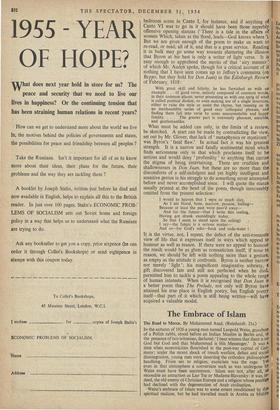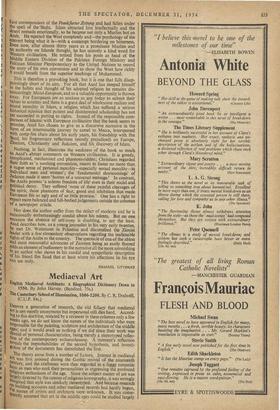The Embrace of Islam
The Road to Mecca. By Muhammed Asad. (Reinhardt. 21s.)
IN the autumn of 1926 a young man named Leopold Weiss, grandson of a Polish rabbi, stood before an Indian Muslim in Berlin and, in the presence of two witnesses, declared:' I bear witness that there is no God but God and that Muhammad is His Messenger.' It was time when eccentricities flourished in the post-war capital of Ger- many; under the recent shock of trench warfare, defeat and social disintegration, young men were deserting the orthodox philosophies headlong. From sex to religion, exoticism was the rage. Ye even in that atmosphere a conversion such as was undergone bY Weiss must have been uncommon. Islam was not, after all, !le recondite an attraction as Lao Tse or Madame Blavatsky : it was, .1-1Y deed, the old enemy of Christian Europe and a religion whose prestige had declined with the degeneration of Arab civilisation. East correspondent of the Frankfurter Zeltung and had fallen under the spell of the Bedu. Islam attracted him intellectually and the desert nomads emotionally, so he became not only a Muslim but an Arab. He rejected the West completely and--the psychology of the Convert being what it is—with a contempt bordering on bitterness. Even now, after almost thirty years as a prominent Muslim and an authority on Islamic thought, he has scarcely a kind word for Western civilisation. He retired from his posts as head of the Middle Eastern Division of the Pakistan Foreign Ministry and Pakistan Minister Plenipotentiary to the United Nations to record the story of his own conversion and to show the West how richly It could benefit from the superior teachings of Muhammad.
This is therefore a provoking book, but it is one that falls disap- pointingly short of its aim. For all that Mad has steeped himself in the habits and thought of his adopted religion he remains dis- concertingly Mittel-European, and so a valuable opportunity is thrown away. For Europeans are as anxious as any today to submit their values to scrutiny and there is a great deal of wholesome realism and sound morality in Islam, a religion which has suffered a serious historical injustice that patient and disinterested scholarship has not Yet succeeded in putting to rights. Instead of the responsible com- parison of Islamic with European civilisation that the book seems to Promise, Asad has chosen to give us a discursive narrative in the form of an interminable journey by camel to Mecca, interspersed With camp-fire chats about his early years, his friendship with Ibn Saud, his fragmentary reflections (mostly prejudiced) on Europe, Zionism, Christianity and Judaism, and his discovery of Islam.
Nothing, in fact, illustrates the weakness of the book so much as Asad's abrupt comments on Western civilisation. It is greedy, complicated, mechanised and phantom-ridden; Christians regarded their faith as 'a soothing convention, meant to foster no more than II vague sense of personal morality—especially sexual morality—in Individual men and women'; the 'fundamental shortcomings' of Judaism made it seem ' barren of a universal message.' In contrast, the Arabs possess 'a solemn freedom of life' even in their social and Political decay. They suffered 'none of these painful cleavages of the spirit, those phantoms of fear, greed and inhibition that made European life so ugly and of so little promise.' One has a right to expect more balanced and full-bodied judgements outside the columns of a newspaper article.
Nor does the author suffer from the defect of modesty and he is occasionally embarrassingly candid about his talents. But on one occasion the absence of self-irony is disabling, to say the least. Asad describes how, as a young journalist in his very early twenties, he met Dr. Weizmann in Palestine and discomfited the Zionist leader with a few elementary observations regarding the inalienable rights of the Arabs to the country. The spectacle of one of the ablest and most resourceful advocates of Zionism being so easily floored !idds an element of buffoonery to the narrative all the more astonishing in an author who shows in his candid and sympathetic description of his friend Ibn Saud that at least where his affections lie his eye can see truly.
EMANUEL LITVINOFP



























 Previous page
Previous page